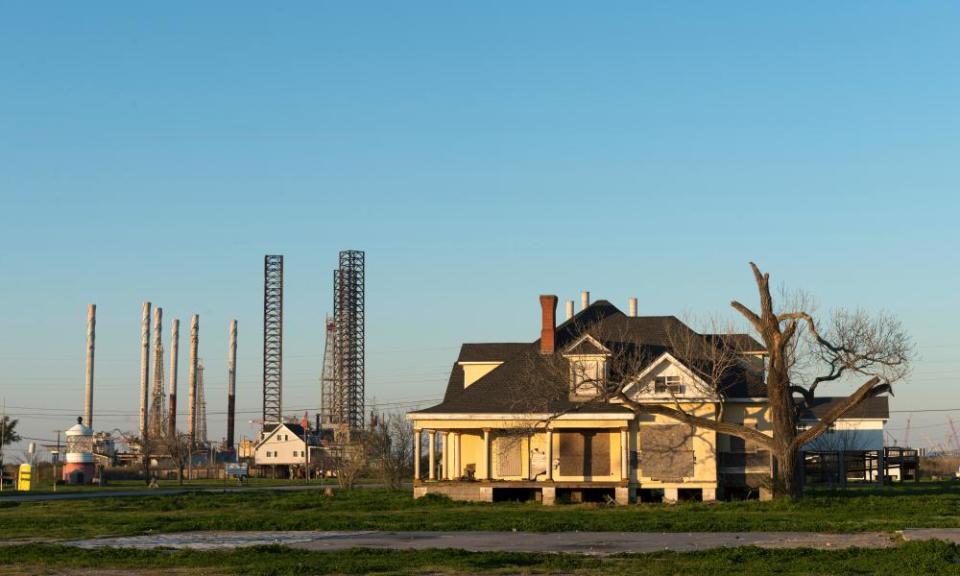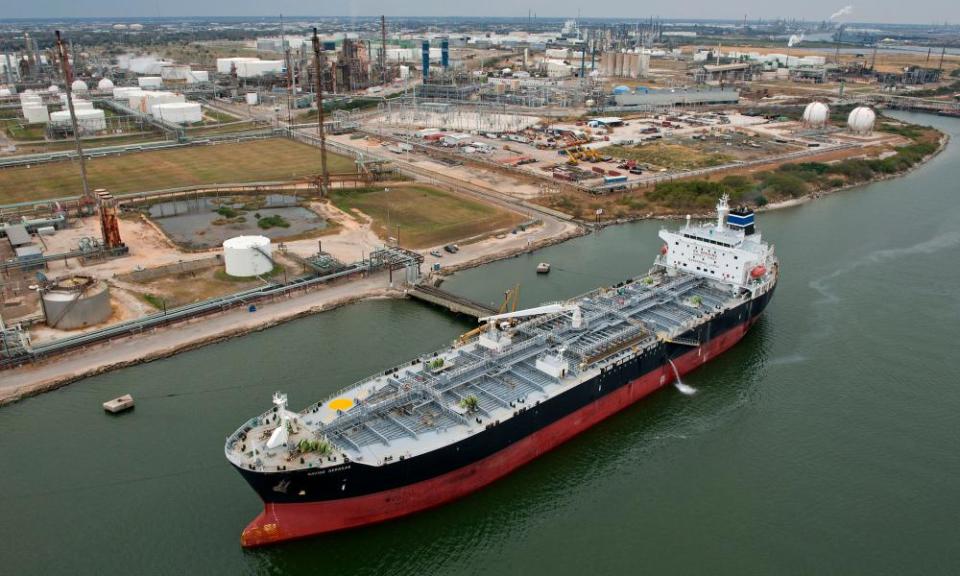World’s largest plastics plant rings alarm bells on Texas coast
Communities fear impact on environment, as fossil fuel companies target region in multi-billion dollar push to increase global plastic production

Donald Trump’s state visit to Saudi Arabia in May will perhaps be best remembered by his participation in an all-male sword dance where he awkwardly waved a ceremonial blade in step with his cabinet and their Saudi counterparts.
But a little-noted deal signed prior to the ceremony is set to worsen a vast problem the world has yet to fully confront – plastic pollution.
In front of a seated Trump and King Salman, Saudi officials posed for photos shaking hands with secretary of state Rex Tillerson and Darren Woods, Tillerson’s successor as chief executive of the oil and gas giant ExxonMobil.

Woods was there to seal a $10bn agreement with the state-owned Saudi Basic Industries Corporation (Sabic) to build the world’s largest plastics facility on the Texas coast, the spearhead of a US boom that will create an enormous new glut of bottles, food packaging, polyester clothing and other products that are already, once discarded, choking the world’s oceans and food chains.
Lavished with more than $1bn in tax breaks by local authorities in Texas to locate the plant on farmland just north of Corpus Christi, Exxon and its Saudi partner have promised the ethane steam “cracker” facility will create thousands of new jobs. Trump called the deal a “true American success story” in a White House statement that included paragraphs copied directly from an Exxon corporate press release.
The Exxon-Sabic project, which will annually produce 1.8m tonnes of ethylene, a key building block of plastics, is just one of 11 chemical, refining, lubricant and gas projects Exxon is building along the US Gulf coast. The region is being divvied up in a multi-billion dollar push by fossil fuel companies that will fuel an anticipated 40% rise in global plastic production over the next decade.
The new plants are likely to have consequences for the climate and the air breathed in by people living on the US Gulf coast. An analysis of 184 planned chemical plants, many of them strung along the coast of Texas and Louisiana, showed they would collectively emit around 216m tons of greenhouse gases a year once complete.
“Many of these projects are approved so quickly that you are left with highly polluting operations,” said Eric Schaeffer, a former senior official at the US Environmental Protection Agency, who prepared the analysis for the Guardian.
“The Gulf coast is a place already covered in pipelines and storage tanks, but it’s now transforming. The scale is overwhelming. Residents will have to decide how much more of this they are prepared to take.”

Exxon’s plastics plant crept up quickly on the residents of San Patricio County, which lies on the north shore of Corpus Christi Bay, around 200 miles south-west of Houston. Last year, the county and then the local school district announced proposals to offer huge tax breaks to a mysterious entity called Project Yosemite.
A hastily-assembled group of concerned citizens discovered this was, in fact, the Exxon-Sabic venture, and used public meetings to protest the location of the proposed plant, which is within two miles of a middle school. Both the county and school district voted to offer the tax breaks to successfully lure Exxon to the area.
“We caused a ruckus,” said Errol Summerlin, a retired legal aid lawyer who became a visible sign of protest at public meetings by wearing a red #No Exxon T-shirt. “Exxon bullied their way in here and are tearing the community apart. All our local officials said they wanted it on a different site but Exxon wouldn’t budge.”
Opponents of the sprawling plant warn that it will produce trillions of small polyethylene pellets that will inevitably find their way into the bay and surrounding landscape, where they would be gobbled by fish or endangered species such as the whooping crane and piping plover.
The facility will also release millions of gallons of piping hot effluent into the bay, a prospect that has spooked fishers, and suck up 20m gallons of water a day in part of the US that has been parched by drought.
The consortium, known as Gulf Coast Growth Ventures, is now awaiting permits from state authorities, which could be granted within a few months, allowing construction to begin by 2019.
“Some people have moved away from here because they see it as inevitable,” said Summerlin, who has lived in the area since 1984.
“We are not naive, we understand who we are up against. If you put Exxon’s money together with the Saudi royal family’s, then lord have mercy, that’s an enormous ring of wealth. But some of us think ‘to heck with this, if you want it you will at least have to fight for it.’ Are we to be completely surrounded by industry here?”
Gulf Coast Ventures, which declined to comment, has previously stated environmental protection is a “key priority” and will impose emissions controls and use bleach in its cooling towers to improve the quality of its wastewater.
But environmentalists have long tangled with the operators of plastic plants along the Gulf coast and are sceptical Exxon will prove a better neighbour. At Point Comfort, further north up the coast from Corpus Christi, Formosa Plastics has been accused of contributing to the ruin of the local shrimping industry by riddling the water with dumped plastic pellets and powders.
“I feel like how Geronimo felt when he saw all the settlers coming in,” said Diane Wilson, a former commercial shrimper who has waged a long battle against Formosa and is now suing the company over its alleged pollution.
“The industry just expands and expands and expands. It’s like seeing your home destroyed. My family was in the shrimping industry for 100 years and I never thought it would all just go within a decade.”
The resurgence in industry along the Gulf coast has buoyed those voters who warmed to Trump’s caustic laments over the loss of US manufacturing muscle to Mexico, China and other countries. Trump has promised “jobs, jobs, jobs” from the new expansion, quantified by industry groups as being in the hundreds of thousands over the coming decade.
But the administration’s enthusiasm for fossil fuels is also exacerbating roiling fights across the US over the spread of oil and gas pipelines. The vast Dakota Access project, which sparked fierce clashes between native American tribes and police in North Dakota, has caused fresh consternation with a plan to build a 162-mile pipeline at its tail, which would bring oil to Louisiana.
A protest camp, similar to the one near the Standing Rock reservation in North Dakota, has taken root in the path of the Bayou Bridge pipeline, which recently got its stamp of approval from the federal government. The pipeline would cross the Atchafalaya Basin, the largest wetland in the US. Five plastics plants, one of them backed by Dow Chemical, are also planned for the surrounding area, just north of New Orleans.
“This is already one of the most polluted areas of the US and yet as a society we seem to be willing to ruin people’s lives for plastic,” said Cherri Foytlin, who heads a community group that warns a pipeline leak would befoul the wetland and cripple the local crawfish industry.
Foytlin, who is of Navajo and Cherokee decent, moved to the Gulf coast because her then-husband was an oil worker. The BP oil spill of 2010 brought an epiphany for Foytlin while she was helping tend to dying pelicans, an activism that has been further provoked by the Trump administration’s peeling away of environmental regulations and the uprising at Standing Rock.
“We are not Standing Rock, but I expect we will have to put our bodies on the line at some point in a nonviolent way” she said. “I have yet to see one of these companies come in and not poison the community. I’ll believe it when I see it.
“It’s silly to think we should destroy the planet for a few moments of convenience. My grandma didn’t have plastic cups, we used old mixing jars. I don’t need that junk. We should recycle or make things out of wood or glass. I mean, how much more plastic do we need anyway?”

